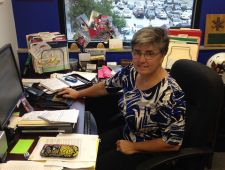The field experience supervisor who has worked 19 years at Cabrini and 10 years in the education department, Colleen Poole said “Our college is a model for the state of education.”

Poole has been organizing and setting up transportation while scheduling education majors who are prepared for field work for the past 10 years. Freshmen generally take basic introductory courses the first year while sophomore year students begin to prepare for this field work.
Field work includes 80 hours of experience per student and semester. Students are exposed to four different grade levels in order to help them achieve the most experience for life after college.
Some are exposed to students with “learning differences” while special education majors have different criteria in the field. In order to get started with this work, each student is required to obtain background checks to begin work in other schools and with the children. For some of these clearances, it is mandatory for them to be renewed yearly.
One clearance in particular, the child-abuse clearance, takes up to a month to accomplish. If a student does not renew these certificates and clearances in a timely fashion, it is very difficult for scheduling with classes and field work and would likely make the student fall behind since it is such a time consuming major.
This is where some miscommunication took place which Francie McPeak, a junior education major, mentioned. McPeak said she has not had any issues specifically from the school and said “Mrs. Poole is very on her game and is very organized and helpful.” The only specific issues McPeak has is time management with a five credit super science course while maintaining a part -time job and other classes as well as field work. McPeak also said she finds it easier to get all the work done sooner in order to keep herself moving. “It is stressful and depending on your supervisor it can change your whole experience in field,” McPeak said. “As long as you work with Mrs. Poole, things go a little bit smoother.” Amie Roetz, a sophomore education major, said she knew since she was young that she wanted to be a teacher. Roetz mentioned that her scheduling worked well without issues and enjoys observing and completing lesson plans. “About 75 to 80 percent of our graduating class is currently working in the field”, Poole said.



